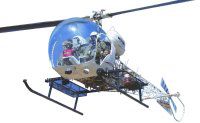National volunteers of the year assist in local mustang roundup Ron and Carol Pownall from Vicksburg, MO. were in their height of glory last Tuesday helping BLM officials gather wild mustangs from Cedar Ridge, far above Cottonwood Canyon in East Carbon County. The Pownalls adopted their first wild mustang in 1999 and have been adopting these free-spirited horses ever since. |
High above Cottonwood Canyon overlooking the Northeast end of Nine Mile Canyon a group of cowboys have been busy rounding up horses the past week.
But this is not your typical roundup. This particular gathering is headed by a 30-year veteran who knows the canyons and hillsides like the back of his hand. He knows the coulees and which springs make up the high desert country in East Carbon County.
This veteran cowboy wasn’t decked out in wranglers and chaps with a wide-brimmed stetsen or leather cowboy boots. He didn’t handle a lasso and ride smoothly in his custom saddle. This cowboy is a helicopter pilot, who has been gathering wild mustang horses for the Bureau of Land Management (BLM) in Utah since the early 70’s.
BLM Adopt-A-Horse program finds homes for wild mustangs BLM needs to find good homes for the 4,000 wild horse and burros we have in our corral facilities through the bureau’s Adopt-A-Horse or Burro Program,” said Lee Delany, group manager for the BLM’s Wild Horse program in a recent newsletter, adding, “We need to find as many good adopters as possible to make room for the animals that we will be gathering from the emergency.” |
Cowboying from helicopters is unique and effective, especially when you are tracking down and herding wild mustangs into captivity. The past week BLM crews have gathered an estimated 180 mustangs from the eastern mountains of Carbon County.
It was deemed an emergency gather this year because of severe drought conditions and recent wildfires throughout the western United States. Thousands of acres of habitat for America’s wild horses have been destroyed and this prompted the BLM to conduct emergency gathers to save as many of these animals as possible.
“We could be facing emergency gathers of more than 4,000 animals,” said Lee Delany, group manager for the BLM’s Wild Horse program in a recent department newsletter.
These removals ensure the rangelands will remain healthy for the remaining wild horses.
Free roaming herds are monitored and excess animals are removed from public lands to ensure an ecological balance will be maintained for the remaining wild free roaming horses and throughout the western states, as well as native wildlife and livestock.
“These animals are a living legend that symbolize the historic and pioneer spirit of the Old West,” said Lisa Reid, BLM public relations specialist from Cedar City.
For the most part the horses that were gathered last Tuesday appeared to be strong and healthy, most having slick black coats. But the animals were thinner than normal because of the drought.
The set up, conducted by the BLM and its volunteeers, went like clockwork the first day on the range . Corrals, referred to as the trap were set up on a corner of a large fenced pasture, tucked under a hillside. The fences leading into the trap were camouflaged with burlap netting on both sides of the fences leading to the trap.
The vehicles were hidden in a far-off grove of juniper or pinyon trees, the cowboys took their places along the outside of the fence, hiding under large sagebrush plants. Two cowboys took trained horses, known as “Judas” horses to the top of the hill overlooking the trap and the men knelt as the helicopter twirled away from the setting on its way to bring in the first group of mustangs.
It was a hurry up and wait situation. The sun was already climbing in the east, a faint breeze rustled through the sagebrush and pinyons, the high desert was perfectly quiet.
Then the tranquility was broken by the twirling of the helicopter as it swirled and wound its way over the canyons and coulees, appearing to be chasing fast moving birds, but then the horses appeared. Slick black mustangs, racing over the horizon, mares with their colts, geldings and stallions, all thundering over the prairie trying to free themselves from the hovering giant in the sky.
But within seconds the “Judas” horses guided the wild mustangs into the trap, gates were closed, and the new life of a once free-spirited mustang changed. Many of the gathered horses will be adopted and someday find themselves domesticated on family farms and ranches.
Once the mustangs were gathered they were hauled to the corrals in Nine Mile Canyon where they were sorted. The mares and colts were paired up again and released, while the team carefully determined the numbers of mares, geldings and stallions to be adopted and the rest, returned to the range. All the animals received their vaccinations and worming medication.
The helicopter cowboys continued gathering mustangs throughout the day, sometimes bringing in as many as 15 horses at a time, but more often settling for three or four. The farther away from the trap the horses were found, the longer it took to gather and the fewer they were able to roundup at one time.
The BLM gathers nearly 10,000 wild horses off public lands per year. The wild horse is recognized by congress as a part of America’s heritage and the BLM is entrusted with maintaining and preserving these living legends.
Since the wild horse has virtually no natural predators and herds reproduce at an average rate of 25 percent per year, they can quickly over populate an area and deplete available food and water supplies. “It is not healthy or responsible to let the horses over populate the range,” concluded Reid.

